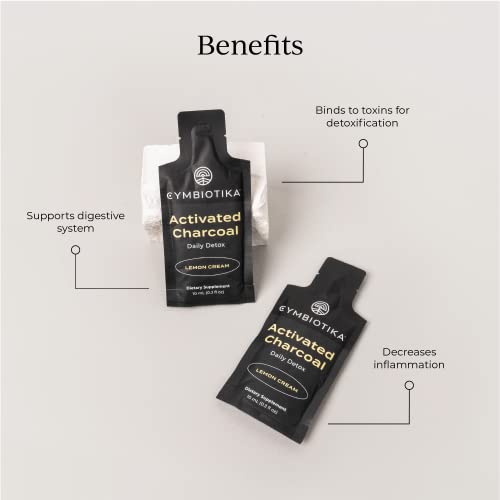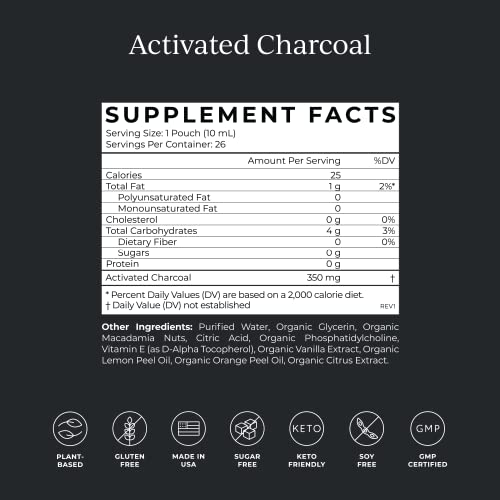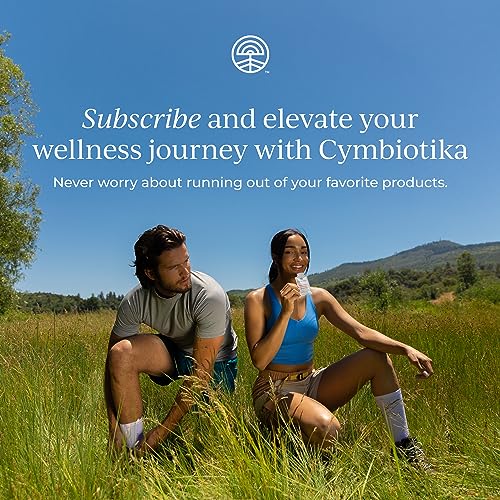







CYMBIOTIKA Activated Charcoal Liquid Supplement - Gut Health & Detox Support, Vegan - 26 Pouches


Carbon
High RiskCarbon is an amorphous form of elemental carbon commonly used in various products. It serves multiple functions, including acting as a pigment, filler, or adsorbent, depending on the formulation. Its versatile applications span across personal care, cosmetics, and other industries.
Sustai Insights
Carbon has functional benefits such as enhancing product texture and stability. It is generally considered low in health risks, with minimal concerns regarding carcinogenicity, allergies, and reproductive toxicity. However, its use is subject to high restrictions due to regulatory concerns about safety and environmental impact, including potential pollution and bioaccumulation. The overall risk associated with carbon is high, necessitating careful consideration in product use. Alternatives like plant-based pigments or biodegradable fillers may offer safer options.
Citric Acid
Medium RiskCitric acid is an alpha hydroxy acid used in personal care products primarily for its role as a pH adjuster and natural preservative. It occurs naturally in citrus fruits and is commonly utilized in various formulations for its chelating properties and mild exfoliation benefits.
Sustai Insights
Citric acid offers functional benefits as an effective preservative and pH stabilizer, contributing to product longevity and stability. It is biodegradable and derived from renewable sources. Health risks are low, with minimal concerns regarding carcinogenicity, allergies, and reproductive toxicity. However, moderate use restrictions exist due to potential irritation at high concentrations. Environmental risks are limited, as citric acid is not known to accumulate in ecosystems. Regulatory agencies have no significant advisories against its use. Overall, it is assessed as a medium-risk ingredient, with safe usage practices recommended and alternatives available.
Lecithin
Medium RiskLecithin is a naturally occurring lipid found in various plant and animal tissues, primarily composed of phospholipids. It serves as an emulsifier, stabilizing mixtures of oil and water, and is commonly used in food, cosmetics, and pharmaceuticals to improve texture and extend shelf life.
Sustai Insights
Lecithin provides functional benefits as an effective emulsifier and stabilizer, enhancing product texture while being sustainably sourced from natural origins. Health risks are generally low, with moderate concerns regarding allergies and immunotoxicity but minimal cancer or reproductive toxicity risks. Environmental hazards are limited, and it is not classified as a pollutant. Regulatory bodies impose few restrictions. Overall, lecithin presents a medium risk, suggesting caution in usage, especially for sensitive individuals. Alternatives include sunflower lecithin or other plant-based emulsifiers that may offer similar benefits with reduced allergenic potential.
Tocopherol, D Alpha
Low RiskTocopherol, specifically d-alpha tocopherol, is a naturally occurring form of Vitamin E. It is commonly used in cosmetic and personal care products primarily for its antioxidant properties, helping to protect formulations from oxidation and extend shelf life.
Sustai Insights
D-alpha tocopherol provides effective antioxidant benefits, contributing to product stability. It is sustainably sourced and generally regarded as safe, with low concerns regarding carcinogenicity, allergies, and reproductive toxicity. However, there are minor concerns about endocrine disruption. Regulatory bodies have not imposed significant restrictions, indicating low overall risk. Recommended usage practices include adhering to established safe concentration thresholds. Alternatives, such as other forms of Vitamin E or plant-based antioxidants, may also be considered.
Citrus Limon (Lemon) Peel
Low RiskCitrus limon (lemon) peel is derived from the outer skin of lemons and is commonly used in cosmetic formulations for its aromatic properties and potential skin benefits. It serves primarily as a fragrance agent and may also provide antioxidant effects.
Sustai Insights
Citrus limon (lemon) peel is valued for its aromatic contributions and potential antioxidant properties, which can enhance product appeal. It has a low risk of adverse health effects, including low concerns for carcinogenicity, allergies, and irritation. Environmental risks are minimal, with no significant evidence of bioaccumulation or pollution. Regulatory assessments indicate no restrictions on use. Overall, it is considered low risk, and safe usage practices should be maintained. Alternatives may include other citrus peels or natural fragrance compounds.
Tocopherol, D Alpha
Low RiskTocopherol, specifically d-alpha tocopherol, is a naturally occurring form of Vitamin E. It is commonly used in cosmetic and personal care products primarily for its antioxidant properties, helping to protect formulations from oxidation and extend shelf life.
Sustai Insights
D-alpha tocopherol provides effective antioxidant benefits, contributing to product stability. It is sustainably sourced and generally regarded as safe, with low concerns regarding carcinogenicity, allergies, and reproductive toxicity. However, there are minor concerns about endocrine disruption. Regulatory bodies have not imposed significant restrictions, indicating low overall risk. Recommended usage practices include adhering to established safe concentration thresholds. Alternatives, such as other forms of Vitamin E or plant-based antioxidants, may also be considered.
Carbon
High RiskCarbon is an amorphous form of elemental carbon commonly used in various products. It serves multiple functions, including acting as a pigment, filler, or adsorbent, depending on the formulation. Its versatile applications span across personal care, cosmetics, and other industries.
Sustai Insights
Carbon has functional benefits such as enhancing product texture and stability. It is generally considered low in health risks, with minimal concerns regarding carcinogenicity, allergies, and reproductive toxicity. However, its use is subject to high restrictions due to regulatory concerns about safety and environmental impact, including potential pollution and bioaccumulation. The overall risk associated with carbon is high, necessitating careful consideration in product use. Alternatives like plant-based pigments or biodegradable fillers may offer safer options.
Citric Acid
Medium RiskCitric acid is an alpha hydroxy acid used in personal care products primarily for its role as a pH adjuster and natural preservative. It occurs naturally in citrus fruits and is commonly utilized in various formulations for its chelating properties and mild exfoliation benefits.
Sustai Insights
Citric acid offers functional benefits as an effective preservative and pH stabilizer, contributing to product longevity and stability. It is biodegradable and derived from renewable sources. Health risks are low, with minimal concerns regarding carcinogenicity, allergies, and reproductive toxicity. However, moderate use restrictions exist due to potential irritation at high concentrations. Environmental risks are limited, as citric acid is not known to accumulate in ecosystems. Regulatory agencies have no significant advisories against its use. Overall, it is assessed as a medium-risk ingredient, with safe usage practices recommended and alternatives available.
Lecithin
Medium RiskLecithin is a naturally occurring lipid found in various plant and animal tissues, primarily composed of phospholipids. It serves as an emulsifier, stabilizing mixtures of oil and water, and is commonly used in food, cosmetics, and pharmaceuticals to improve texture and extend shelf life.
Sustai Insights
Lecithin provides functional benefits as an effective emulsifier and stabilizer, enhancing product texture while being sustainably sourced from natural origins. Health risks are generally low, with moderate concerns regarding allergies and immunotoxicity but minimal cancer or reproductive toxicity risks. Environmental hazards are limited, and it is not classified as a pollutant. Regulatory bodies impose few restrictions. Overall, lecithin presents a medium risk, suggesting caution in usage, especially for sensitive individuals. Alternatives include sunflower lecithin or other plant-based emulsifiers that may offer similar benefits with reduced allergenic potential.
Citrus Limon (Lemon) Peel
Low RiskCitrus limon (lemon) peel is derived from the outer skin of lemons and is commonly used in cosmetic formulations for its aromatic properties and potential skin benefits. It serves primarily as a fragrance agent and may also provide antioxidant effects.
Sustai Insights
Citrus limon (lemon) peel is valued for its aromatic contributions and potential antioxidant properties, which can enhance product appeal. It has a low risk of adverse health effects, including low concerns for carcinogenicity, allergies, and irritation. Environmental risks are minimal, with no significant evidence of bioaccumulation or pollution. Regulatory assessments indicate no restrictions on use. Overall, it is considered low risk, and safe usage practices should be maintained. Alternatives may include other citrus peels or natural fragrance compounds.
Discover the CYMBIOTIKA Activated Charcoal Liquid Supplement, a powerful ally for gut health and digestive support. This vegan-friendly supplement combines activated charcoal and Vitamin E to help cleanse and detoxify your body, making it a perfect choice for health-conscious consumers seeking natural wellness solutions.
- Gut Health Support: This supplement aids in alleviating common gastrointestinal issues like gas and bloating, promoting overall digestive balance.
- Convenient On-the-Go Solution: Perfect for travel, post-meal refreshment, or after a night out, each 10ml pouch contains a refreshing lemon cream flavor.
- Daily Wellness Routine: Designed for use six days a week, this supplement helps maintain a balanced gut environment.
- High-Quality Ingredients: Crafted with pure activated charcoal and organic components, ensuring a clean, chemical-free product that aligns with a healthy lifestyle.
- Sustainable Practices: Cymbiotika emphasizes ethical sourcing and production, providing consumers with confidence in their health and environmental impact.
Experience a natural, effective way to support your digestive health with CYMBIOTIKA.
Subscribe & Save with Sustai
- Best Price Guarantee: Always enjoy the lowest prices on sustainable home essentials.
- No Surprises: We’ll notify you before shipping. No hidden fees, ever.
- You’re in Charge: Change, pause, or cancel your subscription anytime with ease.
- Eco-Friendly Deliveries: Our grouped shipments mean less packaging and lower emissions.
Join us on a sustainable journey. Special offers for a limited time! Prices and promotions may change.
Recommended Products
Discover the CYMBIOTIKA Activated Charcoal Liquid Supplement, a powerful ally for gut health and digestive support. This vegan-friendly supplement combines activated charcoal and Vitamin E to help cleanse and detoxify your body, making it a perfect choice for health-conscious consumers seeking natural wellness solutions.
- Gut Health Support: This supplement aids in alleviating common gastrointestinal issues like gas and bloating, promoting overall digestive balance.
- Convenient On-the-Go Solution: Perfect for travel, post-meal refreshment, or after a night out, each 10ml pouch contains a refreshing lemon cream flavor.
- Daily Wellness Routine: Designed for use six days a week, this supplement helps maintain a balanced gut environment.
- High-Quality Ingredients: Crafted with pure activated charcoal and organic components, ensuring a clean, chemical-free product that aligns with a healthy lifestyle.
- Sustainable Practices: Cymbiotika emphasizes ethical sourcing and production, providing consumers with confidence in their health and environmental impact.
Experience a natural, effective way to support your digestive health with CYMBIOTIKA.

You can have at most 2 Sustainable Steals products in your cart
Customer Reviews
Customers’ View
Customers appreciate the effectiveness and natural formulation of the CYMBIOTIKA Activated Charcoal Liquid Supplement. Many users highlight its positive impact on digestive health, particularly in alleviating issues such as gas and bloating, with comments like "this helped reduce my cholesterol levels and address common digestive problems." The refreshing lemon cream flavor is frequently praised, making it enjoyable to consume, whether taken directly or mixed into drinks. Users also commend the product's high quality and advanced absorption technology, noting that it offers better results compared to traditional powdered charcoal. Additionally, the vegan and natural ingredients resonate well with health-conscious consumers. Overall, customers find this product beneficial for their digestive wellness while aligning with their values of using safe and eco-friendly supplements.
AI-generated from the text of customer reviewsThis product has no reviews yet.




